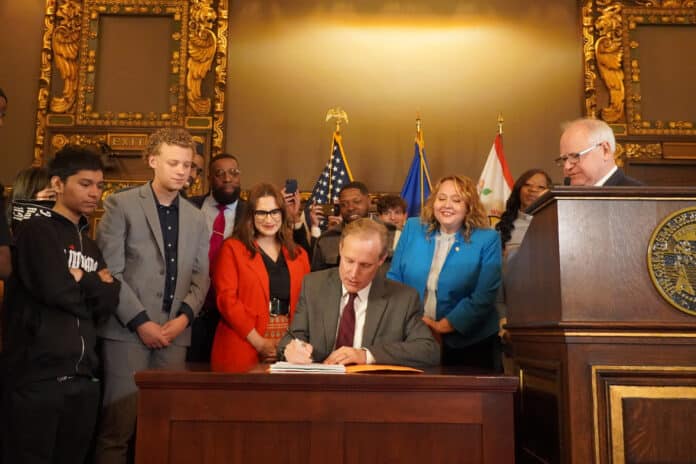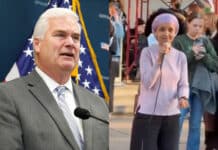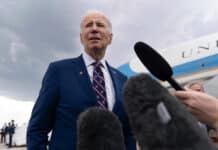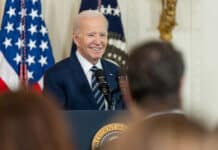
Fresh off a legislative session where Steve Simon was able to check off nearly every item on his election reform “wish list,” the recently re-elected Minnesota secretary of state took some time to speak to both national and local media about how he views the landscape of the upcoming 2024 election, and as he calls it the “democracy business.”
According to Simon, those who intend to suppress the vote with election-related “disinformation” or intimidation may be tripped up by new election-reform laws recently passed by the Democrat trifecta in the Minnesota Legislature. But he told the Washington Post in an interview this week that he doesn’t believe those new voter protections in Minnesota will necessarily deter disinformation efforts come 2024.
“Broadly speaking, disinformation aimed at corroding confidence, I would say well-earned confidence in our electoral system, thereby fanning the flames of doubt,” Simon is quoted as saying in an interview with journalist Tim Starks, who wrote an article on how state elections officials are reacting to a federal district court ruling this month that — at least temporarily — bars the Biden administration and many of its officials across several departments from contacting social media companies “with the purpose urging, encouraging, pressuring, or inducing in any manner, the removal, deletion, suppression, or reduction of content containing protected free speech posted on social-media platforms.”
While the third-term Minnesota DFLer was in D.C. for the National Association of Secretaries of State Conference this week, Simon told the Washington Post’s Starks that he doesn’t believe the ruling has a direct impact on state governments as to whether they can communicate with social media companies about election-related disinformation content posted on their platforms.
“I wouldn’t want anything from that decision to imply that secretaries of state are not within their rights to work with social media companies to make sure their platforms are free of outright disinformation.”
“We want to keep all channels free of that often-organized disinformation campaign,” he said. “We want to be able to work with these partners in social media companies who say, and I believe them, that they want to keep their platforms free of that kind of thing. Who better than those of us in the democracy business to help them clear their channels of organized disinformation?”
That interview was published just two weeks after Simon made a public appearance near New Ulm late last month where he discussed new election reform and voting-related legislation and what he said is a growing problem of election disinformation.
‘Cloud of misinformation threatening Minnesota and the country’
He told attendees of the event, organized by the Brown County DFL Rural Caucus, that there is a “cloud of misinformation threatening Minnesota and the country,” according to a June 29 story in the New Ulm Journal.
Rep. Emma Green, DFL-Minneapolis, was also on hand at the event to discuss the laundry list of new election bills she sponsored — that were wrapped into HF3 — which was coined by Democrats “The Democracy for the People Act.” That bill included several provisions that were criticized by Republican legislators as overly-broad and, in cases, alleged to be unconstitutional.
“We have an anti-disinformation provision that says those that intentionally [lie] about the election system and [lie] with the expressed purpose of getting in the way of someone’s right to vote or register to vote, you will be punished and penalized by the State of Minnesota,” Simon is quoted as telling the Brown County DFL audience.
That provision, now law, drew scrutiny from Rep. Walter Hudson, R-Albertville, who said in a February legislative hearing that its language doesn’t clearly enough define crimes of voter intimidation or interference with voting or the election process.
“My concern is that if we’re not deeply specific about what constitutes both intimidation and misinformation, this could very quickly become a tool used for political ends to curtail speech whatever side happens to be in executive control just doesn’t like,” said Hudson.
But those concerns did not prevent the DFL-controlled House and Senate from passing HF3 on party-line votes in May.
Back in southern Minnesota, Simon took time to tell attendees at the June 29 Brown County DFL event that states like Texas, Florida and Montana are rolling back laws that gave people voting access and are now “making it hard to register to vote,” according to the New Ulm Journal story.
Rep. Greenman is also quoted in the story as telling the audience that those same states “are restricting voting especially for black, brown and disabled folks.” The story didn’t articulate which laws either Simon or Greenman were referring to.
Hank Long
Hank Long is a journalism and communications professional whose writing career includes coverage of the Minnesota legislature, city and county governments and the commercial real estate industry. Hank received his undergraduate degree at the University of Minnesota, where he studied journalism, and his law degree at the University of St. Thomas. The Minnesota native lives in the Twin Cities with his wife and four children. His dream is to be around when the Vikings win the Super Bowl.
















